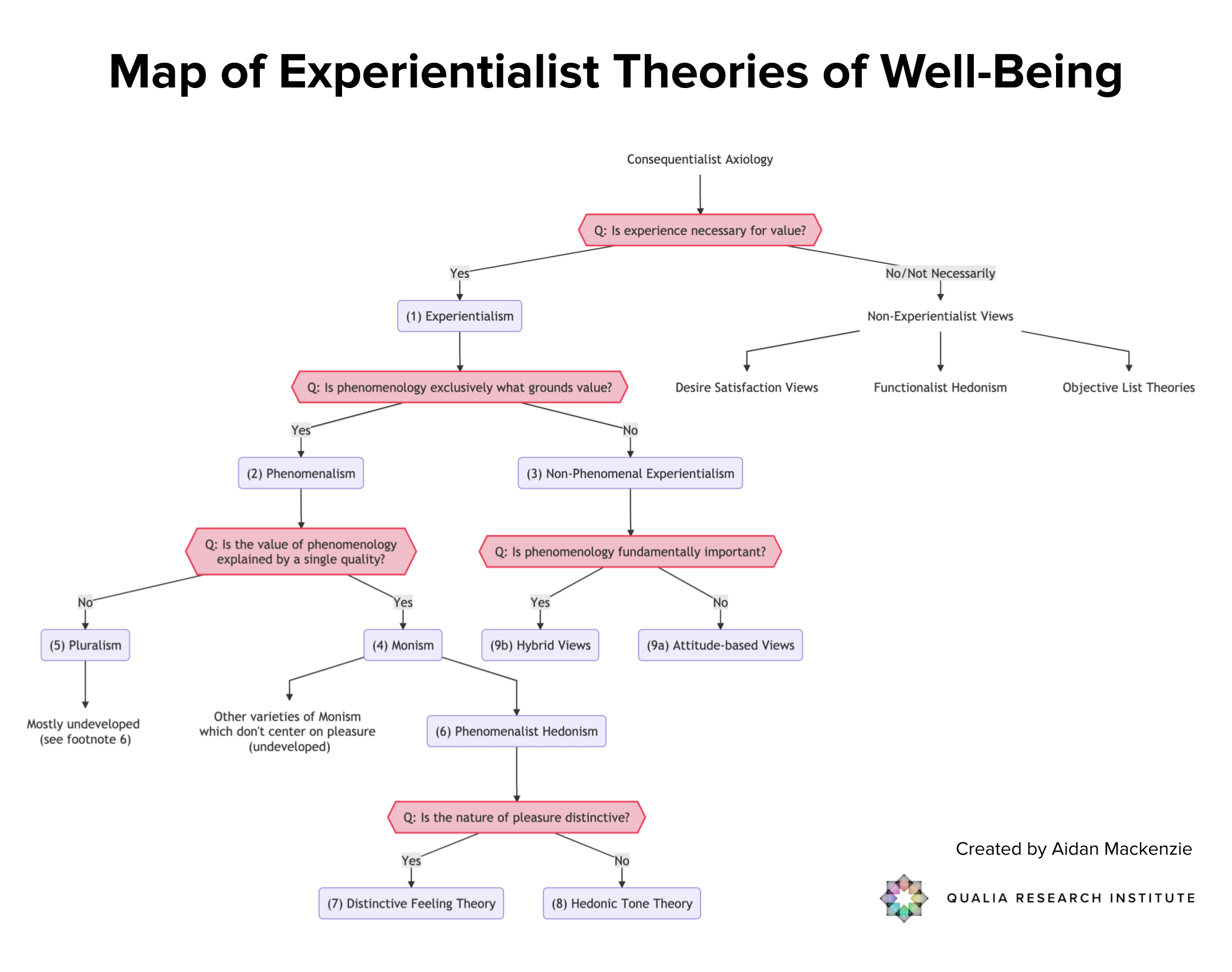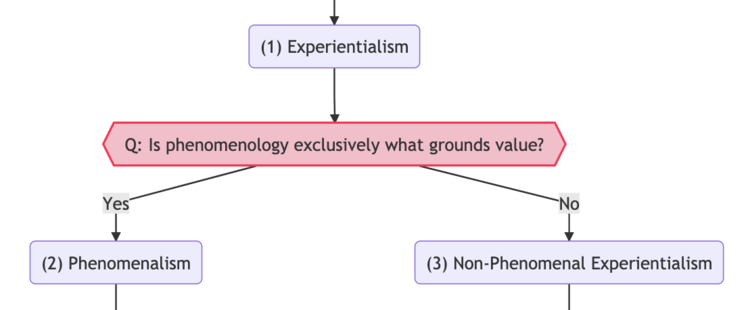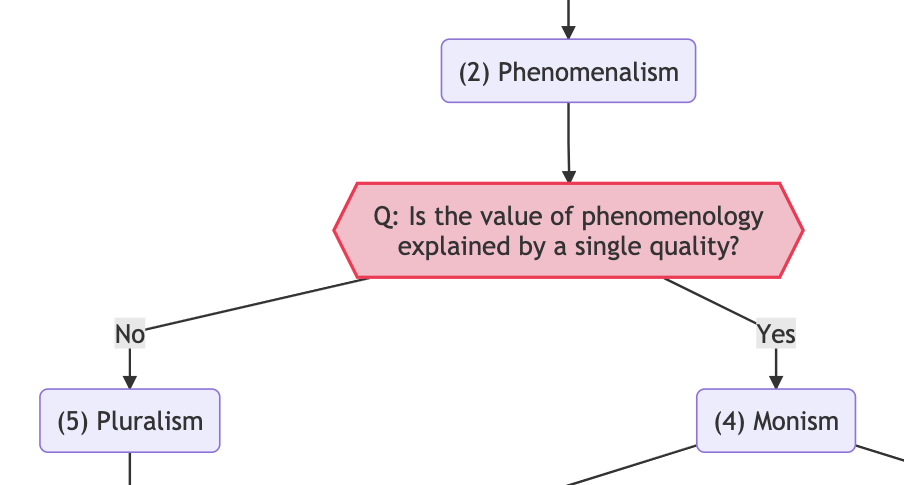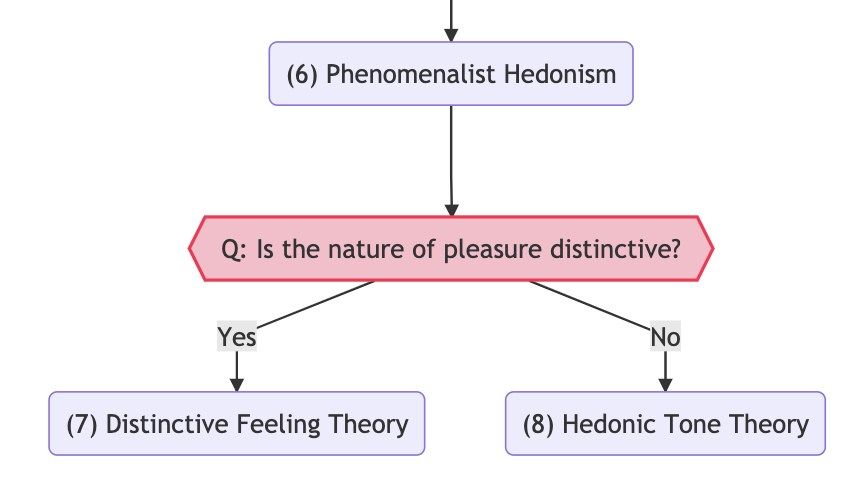TLDR
This post discusses and explores the philosophy of well-being, a subtopic in moral philosophy. I focus on outlining what I call “experientialist” views — the class of views which argue that experience is necessary for well-being. I aim to illustrate why these views, and the discussion around them, can more thoroughly frame hedonism and other theories which attempt to explain value in terms of phenomenology.1 I also offer recommendations of relevant academic philosophy research for further reading. Motivated by Olah & Carter’s “Research Debt” (Olah and Carter 2017), this piece distills the existing academic discussion of hedonism into an easy-to-understand map.
Introduction
In moral philosophy, well-being is defined as what is non-instrumentally good for an individual. For example, catching the bus after work is good because it leads to other good things such as being punctual and having more time to spend with family and friends, but feeling happy is good in and of itself. Well-being is the good that is good in and of itself for an individual.
There are many philosophical questions surrounding well-being. We might wonder whether being altruistic leads to more well-being than succeeding in one’s career, or we might debate how we can measure the subjective elements of happiness for the purposes of calculation (as is often important in economic debates).
However, this post focuses on the more fundamental question of well-being: what fundamentally makes something count as wellbeing? Another way to phrase this question is to ask why is it that certain states of mind count as positive well-being while others do not? In philosophy, answers to this question typically fall into three broad camps: (1) Hedonism, (2) Desire-based theories, and (3) Objective List theories (Crisp 2017). My project in this post is to consider the first of these camps and to argue that we ought to reconceptualize this camp as the “experientialist camp” where the theory of hedonism is a specific version of a wider classification. My hope is that by detailing the wider space around hedonism I can (A) introduce readers to the field of philosophical well-being and (B) offer a framework that can aid proponents and critics of hedonism to be more precise in their disagreements.
The game-plan then is to discuss theories of well-being that focus on phenomenology, with an eye towards defining hedonism.
In the field of well-being, hedonism is often thought of as a distinct type of theory for two main reasons. First, hedonism is clearly distinct from desire-based theories in that it focuses directly on the way experiences feel subjectively rather than on the forming and fulfillment of desires. Second, as a matter of how philosophy progressed historically, hedonism developed as part of larger theories of consequentialist ethics and so was the first mainstream experientialist theory. However, while the way experiences subjectively feel is certainly a core aspect of hedonism, it is not logically required that pleasure is the only thing about subjective experience that is valuable;2 you could also think that other elements of conscious experience such as novelty or fulfillment or aesthetic experience make conscious experiences valuable.
In order to show how it is more accurate to think of hedonism as a specific variant of the broader class of “experientialist” theories of well-being, it’s important for us to take a step back.
Map of Experientialist Theories of Well-Being
To guide the rest of the piece, I created the following diagram which illustrates the space of philosophical views within experientialist theories of well-being:

Note: the (numbers) that precede the following paragraphs match the (numbers) on the diagram.
(1) Experientialism
I define experientialism3 as the class of theories which hold that experience is a necessary requirement for well-being, where “experience” is the having of subjective conscious experience. It is important to note just how broad the requirements of experientialism are. Experientialism does not imply or require that well-being must necessarily be based in phenomenology or that specific types of phenomenology make experience valuable. The only thing that experientialism requires is that subjective experience be part of the story of how well-being works. As we will see, this requirement allows for views where attitudes or desires may play the starring role and phenomenology is secondary.
Even though virtually no philosophers endorse experientialism on its own without also making further commitments, it is useful to define the broad position to illustrate how the map of views proceeds from broadest to most specific.
Now that we’ve defined experientialism, the next step is to consider how experientialists see the role of phenomenology for determining well-being. We can do this by asking “Is phenomenology exclusively what grounds value?” If the answer is yes, we reach (2) Phenomenalism, where phenomenology plays the definitive role for well-being. If the answer is no, we reach (3) Non-Phenomenal Experientalism, where phenomenology is not the primary value-conferrer.

(2) Phenomenalism
If we accept that phenomenology plays the definitive role for explaining well-being, then we enter the subspace of “phenomenalist views of well-being.” We can define these as the class of views which hold that experience is not only necessary for well-being, it is necessary because experience contains phenomenology, which is what ultimately makes experiences valuable. The additional commitment here is subtle but important. Phenomenalism about well-being adds the commitment of thinking that experience is valuable in virtue of phenomenology, which we can understand as the what-it-is-likeness of a mental state. At this point, it is this concept of what-it-is-likeness (or subjective feeling) that commonly demarcates hedonism within the well-being literature.4 However, phenomenalism about value is not yet as specific as hedonism since phenomenalists need not take a specific stance on whether the value of phenomenology is explained by pleasure or some other phenomenal quality.
(3) Non-Phenomenalist Experientialism
The other option is to hold that while experience is necessary for well-being, phenomenology is not the primary determinant of the value of well-being. We can call this class of views “non-phenomenal experientialist views.” The additional step made here is less substantive than the step in (2) since non-phenomenalist theorists are merely rejecting phenomenalism and still have room to develop the positive aspects of their views.5
If we return to phenomenalism, the next question to ask is: “Is the value of phenomenology explained by a single quality?” If the answer is yes, we reach (4) Monism, and if the answer is no, we reach (5) Pluralism.

(4) Monism
Phenomenalist-monism argues that the value of phenomenology is explained by a single quality. Note that while this seems very close to hedonism, phenomenalist-monism is also consistent with views where some other quality grounds value. For example, you can technically be a phenomenal-monist if you believe that the experience of the color pink is the only value-conferring phenomenal quality. And even though this may seem intuitively wrong upon introspection (because what about pleasure and all those positive, non-pink visual experiences!?), such views are not incoherent.
(5) Pluralism
The other option for a phenomenalist is to be a pluralist and hold that the value of phenomenology is explained by multiple phenomenal qualities. While phenomenal-pluralism has few defenders and the space is relatively unexplored, there has been some work in this area and some recent movement in this direction. For academic works in this area see Van der Djiel’s “Is Pleasure All That Is Good about Experience?” and Labukt’s “Hedonic Tone and the Heterogeneity of Pleasure.” Additionally, there is a case to be made that certain forms of Buddhist thought line up with phenomenalist-pluralism.6
(6) Phenomenalist Hedonism
Finally, by diving deeper into phenomenalist-monism, we reach hedonism. Specifically, we reach phenomenalist-hedonism when we follow up phenomenalist-monism with the specific claim that phenomenology is valuable because of the quality of pleasure. Phenomenalist-hedonism holds that pleasure is the value-making quality within complex mental states. Moreover, phenomenalist-hedonism claims that the entire value of conscious experience is explained and grounded by the single phenomenal character of the quality of pleasure.
While the position of phenomenal-hedonism is close to the ordinary conception of hedonism, it is possible to press for further precision. Specifically, while phenomenalist-hedonism argues that mental states are valuable in virtue of being pleasurable, we can still ask for a more precise account of just how pleasure works.7 A clarifying question to ask is: should we understand pleasure as a distinctive feeling?

(7) Distinctive Feeling Theory
The first variety of phenomenalist-hedonism is distinctive feeling theory which argues that pleasure is a phenomenal quality with a “distinctive feeling” (a specific way of feeling). According to this view, all pleasurable moments contain some unique phenomenology which is ‘the feeling of pleasure.’ A critic of distinctive feeling theory might ask, if pleasure is such a unique sensation, why is it so much harder to introspectively discern the particular feeling of pleasure than it is to discern a color quale in one’s visual field or notice a bodily sensation? A distinctive feeling theorist may answer by analogy: pleasure is not like “a piece of steak in a dish of steak and potatoes (in which the boundaries of the steak are quite clear) but [like] a small quantity of a particular spice that has been thoroughly blended into a stew or soup: the spice is there, even though it is very difficult to discern” (Lin 2018). With this account of pleasure, distinctive feeling theory offers a version of hedonism where the value of phenomenology can be explained by a phenomenal quality of pleasure that has a specific character. This theory is primarily defended by Ben Bramble (Bramble 2013)(Bramble 2016).
(8) Hedonic Tone Theory
The second variety of phenomenalist-hedonism is hedonic tone theory which argues that pleasure is a more coarse-grained phenomenal quality. Instead of thinking that pleasure is analogous to a spice’s role in food, hedonic tone theorists think of pleasure as being even less specific. Hedonic tone theorists argue that pleasure is the mere quality of “feeling good” in any way. The analogy of choice for the view is that pleasure is similar to “loudness” in that they are both broad dimensions. Just like the sound of a trumpet playing E flat and the sound of a glass shattering on the floor can both be loud, so too can two different experiences both be pleasureful even though pleasure itself doesn’t have its own way of feeling. Roger Crisp, the theory’s foremost proponent, uses a distinction between determinable qualities (such as loudness) and determinate qualities (such as the sound of an E flat plated on a trumpet) and argues that pleasure falls into the former category (See “Determinables and Determinants” (Wilson 2021) for more on this distinction). In my view, Hedonic Tone theory offers a view that successfully escapes many historical problems for hedonism but, in doing so, offers a less compelling account of the phenomenology of pleasure. Hedonic tone theory is defended by Roger Crisp, Shelly Kagan, and Aaron Smuts.
While a distinctive feeling theorist and hedonic tone theorist may come to mostly similar conclusions given the same moral dilemma, it is my sense that they would probably have different approaches for mapping out the space of all possible valenced experiences.8 This in turn may lead them to hold different views in situations that involve mixed valence experiences (Emilsson 2021).
Finally, let’s return to the non-phenomenal views.
(9) Non-Phenomenal Experientialism
Recall that non-phenomenalist experientialists are committed to thinking that experience is necessary for well-being but not, necessarily, to thinking that phenomenology is the main reason why experience is important. Views that fall in this category are usually more similar to desire-based theories than they are to phenomenalist views. For example, Derek Parfit’s view (9a in the diagram) is that in order for something to count as pleasure, a mental state must include a sensation coupled with a “hedonic-(dis)liking” of that sensation.9 For Parfit, our “meta-hedonic desires” — background desires that like or dislike an occurring sensation—are what fundamentally confer value or disvalue. Parfit’s view thus offers an account that is centrally focused on desire but still requires phenomenology in the form of sensations. Another option is to consider hybrid understandings of well-being such as Eden Lin’s view. On Lin’s view, pleasure is a combination of the way pleasure feels subjectively as well as a matter of how one’s attitudes relate to the occurring sensations (Lin 2018). While these views are not as central to experientialism as phenomenalism is, it is important to include them in our taxonomy of positions.
Conclusion
Debates in the philosophy of well-being and meta-ethics often skip straight to the controversial debates on hedonism or the role of phenomenology for well-being. However, I believe that taking time to map out the broader philosophical space of experientialism is worth the time, both because doing so can allow us to develop a more complete map of the philosophical territory and because developing this map allows us to precisely identify the commitments of views such as hedonism. Moreover, exploring the space allows us to see the gaps in our map and work to develop even more compelling theories. In my opinion, there is potential for pluralistic versions of phenomenalism (5 in the diagram) that build off the appeal and successes of hedonism yet offer a more complete understanding of well-being, valence, and the complexities of conscious experience.
Relevant Topics Related to Well-Being
There are many discussions in philosophy, economics, and neuroscience that branch off from the topic of well-being. I have listed a few below but the list is very much incomplete and I would welcome recommendations from readers.
The topic of perception in philosophy of mind (particularly the debates that center on the phenomenological content of visual experiences). See “The Problem of Perception” by Tim Crane and Craig French.
The challenge of measuring subjective well-being in theory and in practice, topics found in applied philosophy and economics. (Mike Johnson’s “Effective Altruism, and building a better QALY” is a good starter)
The broader field of well-being in philosophy (Crisps’s “Well-Being” is a good starter).
The meta-ethical debate over how practical reasons for action are grounded. See Sharon Street’s “In Defense of Future Tuesday Indifference” (2009) and David Sobel “Pain for Objectivists: The Case of Matters of Mere Taste.” (2005).
The problem of how to understand well-being given different theories of personal identity. (Section 3 of Parfit’s “Reasons and Persons” is a good starter for the topic as well as David Shoemaker’s “Selves and Moral Units”)10.
Citation Commentary
Bramble, Ben. (2013) “The Distinctive Feeling Theory of Pleasure.” Philosophical Studies 162, no. 2: 201–17. https://doi.org/10.1007/s11098-011-9755-9.
- Absolutely recommend this paper as it outlines the version of hedonism that I believe is most consistent with QRI’s theory of valence.
Bramble, Ben. (2016) “A New Defense of Hedonism about Well-Being.” Ergo, an Open Access Journal of Philosophy vol 3, no. 20200513. https://doi.org/10.3998/ergo.12405314.0003.004.
- A further piece on hedonism that should be of interest to anyone looking for work that defends hedonism and reviews the literature around hedonism over the 90s, 2000s, and 2010s.
Crisp, Roger. (2006) “Hedonism Reconsidered.” Philosophy and Phenomenological Research vol. 73, no. 3: 619–45. https://doi.org/10.1111/j.1933-1592.2006.tb00551.x.
- A seminal defense of hedonism that did quite a lot to bring hedonism back from the dead. If pressed for time, I would recommend some of the more recent literature first but this piece is definitely worth reading if you are interested in the classic defenses for hedonism.
Crisp, Roger, “Well-Being,” The Stanford Encyclopedia of Philosophy (Fall 2017 Edition), Edward N. Zalta (ed.), URL = https://plato.stanford.edu/archives/fall2017/entries/well-being/.
- The definitive introduction to the field of well-being (though this post argues Crisp underestimates experientialism).
Kriegel, Uriah. (2019) “The Value of Consciousness.” Analysis vol 79, no. 3: 503–20. https://doi.org/10.1093/analys/anz045.
- Excellent survey article that overviews how philosophers think about the “value of consciousness” broadly construed. The article points to further reading in the broader area of philosophy surrounding the value of consciousness (including the field of perception and aesthetic experience)
Lin, Eden. (2018) “Attitudinal and Phenomenological Theories of Pleasure.” Philosophy and Phenomenological Research, vol. 100, issue 3. https://doi.org/10.1111/phpr.12558.
- A great article for both an introduction to attitudinal and phenomenological theories of pleasure as well as an interesting case for a hybrid theory where pleasure is comprised of the correspondence of attitudes and phenomenology.
Ivar Labukt, Hedonic Tone and the Heterogeneity of Pleasure. Utilitas vol 24, no 2, 2012.
- A another defense of pluralism about the value of conscious experience. I would recommend reading Van Der Djeil’s piece first.
Schroeder, Mark, “Value Theory,” The Stanford Encyclopedia of Philosophy (Fall 2016 Edition), Edward N. Zalta (ed.), URL = https://plato.stanford.edu/archives/fall2016/entries/value-theory/.
- The definitive introduction to the field of value theory.
Smuts, Aaron. (2010) “The Feels Good Theory of Pleasure.” Philosophical Studies vol. 55, no. 2: 241–65. https://doi.org/10.1007/s11098-010-9566-4.
- An interesting piece on the phenomenological theory of pleasure. If pressed for time I would recommend the Lin paper above over this article as it is a more concise and more recent review of the topic.
van der Deijl, Willem. (2018) “Is Pleasure All That Is Good about Experience?” Philosophical Studies vol. 176, no. 7: 1769–87. https://doi.org/10.1007/s11098-018-1090-y.
- A great argument for why being a phenomenalist does not require us to be hedonists, or even monists. I think this may be the most helpful for uncovering the work that QRI’s view has to do to establish a fully convincing moral theory.
van der Deijl, W. The sentience argument for experientialism about welfare. Philos Stud (2020). https://doi.org/10.1007/s11098-020-01427-w
- This paper considers the debate between experientialists and “extra-experientialists” - people who think that well-being can be affected by things that do not affect experience. While I have not read this article closely, it seems good for those interested in the debate over whether we should prefer experientialism or other theories of well-being.
Acknowledgments
Thank you Andrés Gómez Emilsson and Andrew Zuckerman for reviewing drafts of this piece.
Tags
Philosophy, Valence, Hedonic Tone
While this post does not present explicit arguments, the way I map out the theories of well-being may constitute an “argument” in the sense that the picture I offer is not a decided fact. My aim is to offer a useful picture of the philosophical space but readers should take this with a grain of salt given that this is a complex space and attempts at mapping may be prone to over-simplifications.↩︎
Van Der Djeil defends this claim in detail in “Is pleasure all that is good about experience?” (2018).↩︎
Note, “experientialism” in this piece refers to experientialism about well-being specifically and is unrelated to experiantalism as discussed by George Lakoff and Mark Johnson.↩︎
You may think that the intuition that ‘what is good about an experience is its subjective felt-quality’ is an argument for hedonism. However, I argue that this intuition is actually an intuition for phenomenalist theories more broadly since pluralists can also consistently argue that what is so good about experience is the subjective felt quality of experience.↩︎
It is worth noting that theories that fit under the “non-phenomenal experientialist” umbrella rarely see themselves as experientialist theories since, usually, the particular theories focus on appeals to non-experientialist explanations. However, as we will see with “hybrid views,” it is logically consistent, though not popular, to be an attitude theorist and also think that experience is a necessary requirement for well-being.↩︎
For example, the Brahmavihara tradition holds that the value of experience is determined by the experiential primitives of “loving-kindness,” “compassion,” “empathic joy” and “equanimity.” Please note that I am by no means an expert on Buddhist philosophy and I mention this view here just in case readers are interested in looking more deeply into this line of thinking.↩︎
Taking a stance on the nature of pleasure is ultimately important for a hedonist. However, it’s also possible for non-hedonists to agree with a particular view of the nature of pleasure (Distinctive Feeling Theory or Hedonic Tone Theory) while still holding a different position for well-being. Thank you Jeffrey Poomkudy for pointing this out.↩︎
I hope to make this problem more clear in an upcoming post.↩︎
See On What Matters. Vol. 1, Chapter 2, #6: “Hedonic Reasons.”↩︎
As far as I know, this topic is fairly undeveloped though, to my estimation, seems quite interesting.↩︎